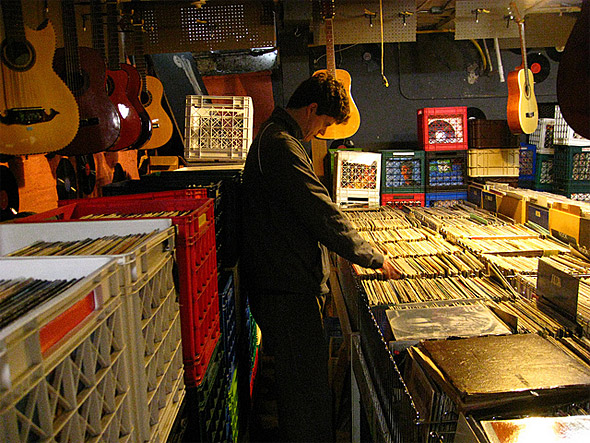London's record stores advise unsigned artists
Blog by Louise Dodgson under Selling & Distributing Your Music

With the ease and low-cost inherent to digital distribution, are the remaining capital’s record stores still willing to take unsolicited material from unsigned artists and should the latter still push for their material to be in these stores?
Many record stores have had to close down in the past few years, fortunately a numerous amount have survived with some even thriving! As most of them do happily accept unsolicited material directly from the hands of unsigned artists, they should also be part of an artist’s business plan.
A record store has an established relationship with their customers and in some cases has developed a brand, associated with quality music. A&R’s also often come down to record stores to discover new material. Moreover, storeowners or managers often have had experience working in a label and have built up an extensive network. These are all things unsigned artists can potentially benefit from. This by no means guarantees that your music will sell. Even location can sometimes be an issue, Spencer Hickman, Rough Trade East manager, explained that sales depending on the genre could vary quite considerably between their East and West stores. But by accepting to take on such material, an artist has already gained approval from one industry player, whom the consumer listens to.
The main aspect, of course, will be the music, though some of the bigger record stores will be reluctant to take on demos or CDR’s; smaller niche stores will be more inclined to do so. Don’t forget that record stores have very limited shelf space and are generally quite picky...so you will face refusal.
Do your homework before you step in the store. Check that they accept your genre, don’t go pitching your heavy metal to a record store specialised in Reggae…
Prepare what you are going to say. Don’t forget that as soon as you walk in that store you are taking on another role; you are there to sell a product to another business.
Most of the record stores won’t have time to actively promote your release. You will be competing on the shelves with the likes of Arcade Fire, Vampire Weekend and The XX. To stand out, try asking them about playing your record in-store (generally it will have its own shelf space on the counter giving you more exposure). Some even have the space to do in-store gigs and some promote evenings. That said, Alan at Cavern Records mentioned that whenever possible, they would often actively promote unsigned material.
As mentioned previously, this is business, so be professional. If not you could lose credibility and money. They will take your material on a sale-or-return basis (getting a direct sales deal is highly unlikely). This means that you will leave your records at the store and if they sell within the time agreed, you will be paid a percentage of the sales price. If the records don’t sell the store will return them to you.
In case the store doesn’t offer you a written agreement, be prepared and bring one yourself. It needs to contain the following points: number of records you have left with the store, when you left them, when they should sell by, their price and your agreed percentage. But it is up to you to check back at the store in the time set out, as the store will definitely not be chasing you. Phil Barton, owner of Sister Ray mentioned that 80% of the time, he never hears back from unsigned artists that have left him material to sell in his store. Considering that stores have a limited space and cannot possibly store your records forever; they will only end up in the bin!
One thing is sure, most of the stores were adamant that it is still worth pitching to them. Successful bands have also done this; Spencer Hickman explained that Vampire Weekend released a 7” through Rough Trade East before signing a record deal!
Rough Trade: www.roughtrade.com
Sister Ray: www.myspace.com/sisterrayshop
Cavern Records: 163-165 High Street, Walthamstow, London, E17 7BX
Image credit: https://bit.ly/2sa4l7O
Tags
record shops, record stores, independent record stores, rough trade records, sister ray, cavern records, london record shops






